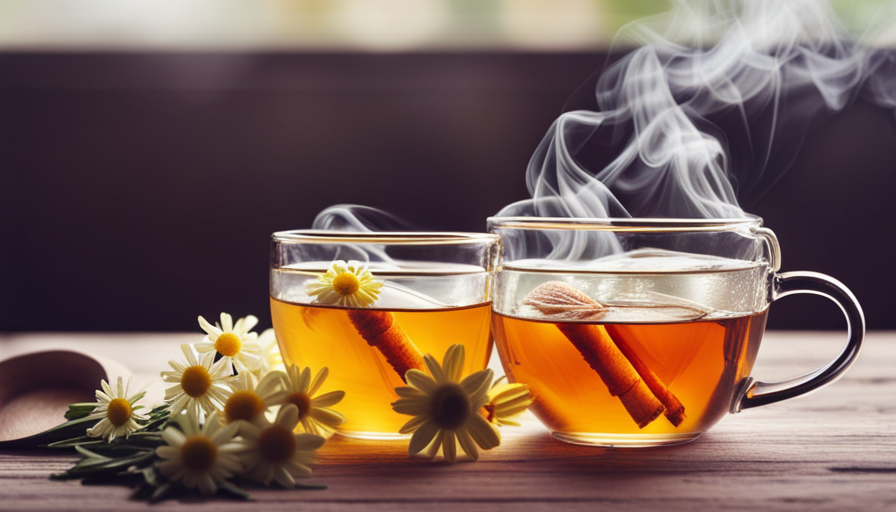Imagine this: on a cold winter night, cozy up with a warm blanket, enjoying a hot cup of herbal tea on the couch. This is the ideal solution for a bothersome cough. Unsure of which herbal tea to pick? Don’t worry, I am here to help you navigate through a selection of herbal teas that are not only tasty but also great for soothing that irritating cough.
From the refreshing and minty Peppermint Tea to the warming and spicy Ginger Tea, these herbal concoctions have been used for centuries to relieve coughs and promote respiratory health.
And let’s not forget about the calming and soothing properties of Chamomile Tea and the sweet and comforting Licorice Root Tea.
For a more invigorating option, there’s Eucalyptus Tea, known for its ability to clear the airways.
And last but certainly not least, Marshmallow Root Tea, with its soothing and anti-inflammatory properties.
In this article, we will explore each of these herbal teas in detail, delving into their unique benefits and the scientific evidence supporting their effectiveness in alleviating coughs.
So, grab your favorite mug and let’s embark on this holistic journey to find the perfect herbal tea for your cough.
Key Takeaways
- Peppermint, Ginger, Chamomile, and Marshmallow Root are herbal teas that are good for cough relief.
- Peppermint tea eases indigestion and bloating, while Ginger tea boosts the immune system and soothes sore throats.
- Chamomile tea promotes sleep and relaxation, while Marshmallow Root tea soothes coughs and sore throats and reduces inflammation.
- These herbal teas provide natural remedies for cough relief and respiratory health.
Peppermint Tea
Peppermint tea is a must-try remedy for coughs, soothing your throat with its refreshing and invigorating flavor. Not only does it taste great, but peppermint tea also offers numerous benefits for digestive health. It has been used for centuries to ease indigestion, bloating, and stomach discomfort. The menthol in peppermint tea helps to relax the muscles of the gastrointestinal tract, promoting healthy digestion and relieving symptoms of digestive disorders.
To make a refreshing peppermint iced tea for hot summer days, simply brew a pot of peppermint tea and let it cool. Once chilled, pour the tea over ice and add a squeeze of fresh lemon or a sprig of mint for an extra burst of flavor. This cooling and invigorating drink will not only quench your thirst but also provide relief for any cough or sore throat you might be experiencing.
Now, let’s move on to another herbal tea that is known for its cough-relieving properties: ginger tea.
Ginger Tea
To soothe your throat and bring relief to your respiratory system, imagine sipping on a warm cup of ginger tea, like a cozy blanket for your cough. Ginger tea has been used for centuries due to its numerous health benefits.
Here are some reasons why you should consider adding ginger tea to your cough-fighting routine:
- Boosts immune system: Ginger is rich in antioxidants that help strengthen your immune system, making it more resilient against respiratory infections.
- Reduces inflammation: The anti-inflammatory properties of ginger can help soothe irritated throat tissues, reducing coughing and discomfort.
- Relieves congestion: Ginger tea acts as an expectorant, helping to break up mucus and clear congestion, making it easier to breathe.
- Soothes sore throat: The warm and soothing nature of ginger tea can provide relief to a scratchy and painful throat.
Making ginger tea at home is simple. Start by peeling and thinly slicing a piece of fresh ginger root. Add it to a pot of boiling water and let it simmer for about 10 minutes. Strain the tea, and add a squeeze of fresh lemon juice or a teaspoon of honey for added benefits.
Transitioning to the next section about chamomile tea, another herbal remedy for coughs, let’s explore its soothing properties.
Chamomile Tea
Imagine yourself sitting in a cozy chair, holding a steaming cup of fragrant chamomile tea, its delicate floral aroma enveloping you in a sense of calm and relaxation. Not only does chamomile tea provide a soothing experience, but it also offers numerous health benefits for sleep and relaxation.
Chamomile tea has been used for centuries as a natural remedy for insomnia and anxiety due to its mild sedative properties. It contains compounds like apigenin, which binds to specific receptors in the brain, promoting sleepiness and reducing anxiety. Sipping on a cup of chamomile tea before bedtime can help you unwind, improve sleep quality, and wake up feeling refreshed.
To make chamomile tea at home, simply steep chamomile flowers in hot water for about 5 minutes. You can add a touch of honey or lemon to enhance the flavor if desired. Incorporating chamomile tea into your daily routine is easy and enjoyable. Whether you prefer to start your day with a cup of chamomile tea or wind down in the evening with a relaxing brew, it can become a comforting ritual that promotes overall well-being.
As we transition to the next section about licorice root tea, let’s explore the unique benefits it offers for cough relief and respiratory health.
Licorice Root Tea
Enveloped in the warm embrace of licorice root tea, let it’s soothing properties and sweet flavor transport you to a world of respiratory relief and wellness.
Licorice root tea has been used for centuries for its numerous health benefits and is particularly effective in treating coughs and sore throats. Licorice root tea contains a compound called glycyrrhizin, which has been shown to have anti-inflammatory and expectorant properties. This means that it can help reduce inflammation in the respiratory tract and promote the expulsion of mucus, making it easier to breathe and providing relief from coughs and congestion. Additionally, licorice root tea has been found to have antimicrobial properties, which can help fight off infections that may be causing the cough or sore throat.
Not only does licorice root tea offer respiratory support, but it also provides a host of other health benefits. It has been traditionally used to soothe digestive issues, support adrenal gland function, and improve overall immune system function.
As we transition into discussing eucalyptus tea, it’s important to note that licorice root tea can be a wonderful addition to your natural cough and cold remedy arsenal.
Eucalyptus Tea
Breathe in the invigorating aroma of eucalyptus tea as it transports you to a serene forest, with its refreshing and revitalizing properties. Eucalyptus tea is not only a delicious herbal beverage but also offers numerous benefits for respiratory health. The active compounds in eucalyptus, such as cineole, have been shown to have decongestant and expectorant properties, making it an excellent choice for alleviating cough and cold symptoms.
To make eucalyptus tea at home, start by boiling water and adding a handful of fresh or dried eucalyptus leaves. Let it steep for about 10 minutes to allow the beneficial compounds to infuse into the water. Strain the leaves and enjoy the warm and soothing tea.
In addition to its respiratory benefits, eucalyptus tea also has antimicrobial properties, which can help fight off infections in the respiratory system. It may also provide relief from sore throat and sinus congestion.
Transitioning into the subsequent section about marshmallow root tea, this herbal remedy has been used for centuries to soothe cough and sore throat.
Marshmallow Root Tea
Soothe your throat and relieve cough symptoms with a warm cup of marshmallow root tea, a centuries-old remedy known for its soothing properties. Marshmallow root tea has been used for centuries to treat various ailments, including coughs and sore throats. It’s rich in mucilage, a gel-like substance that coats the throat, providing relief from irritation and reducing coughing.
The health benefits of marshmallow root tea extend beyond its ability to soothe coughs. It also has anti-inflammatory properties that can help reduce inflammation in the respiratory tract, making it an effective remedy for respiratory conditions such as bronchitis and asthma. Additionally, marshmallow root tea can help alleviate digestive issues, including acid reflux and stomach ulcers.
Making marshmallow root tea at home is simple. Start by boiling 1 tablespoon of dried marshmallow root in 1 cup of water. Let it simmer for about 10 minutes, then strain the mixture and enjoy. You can add honey or lemon for added flavor and additional soothing effects.
Next time you’re battling a cough, reach for a cup of marshmallow root tea. Its natural properties will help soothe your throat and provide relief from those pesky cough symptoms.
Frequently Asked Questions
Can herbal teas completely cure a cough?
Herbal teas can provide relief for a cough, but it’s important to note that they may not completely cure it. Like a soothing balm for the throat, herbal teas can ease cough symptoms and promote overall respiratory health. Their effectiveness depends on various factors, such as the specific herbs used and individual response.
Exploring the science behind herbal teas reveals their potential benefits, but consulting a healthcare professional for recommendations is always advisable.
Are there any side effects or precautions to consider when using these herbal teas for cough relief?
When using herbal teas for cough relief, it’s important to be aware of possible side effects and precautions. One consideration is the potential interactions between herbal teas and medication for cough relief. It’s important to consult with a healthcare professional to ensure that there aren’t any negative interactions.
Additionally, while herbal teas can be effective in relieving cough symptoms, it’s important to note that their effectiveness may vary compared to traditional cough remedies. A holistic approach, combining herbal teas with other remedies, may provide the best results.
Can pregnant women or individuals with specific medical conditions safely consume these herbal teas for cough relief?
Pregnant women and individuals with specific medical conditions should exercise caution when consuming herbal teas for cough relief. It’s essential to consult with a healthcare professional before incorporating any herbal remedies into their routine. While some herbal teas may be safe, others could potentially interact with medications or have adverse effects. It’s important to prioritize the well-being of both mother and baby, and expert guidance is crucial in making informed choices.
How long should one consume these herbal teas to see noticeable improvements in cough symptoms?
To see noticeable improvements in cough symptoms, it’s recommended to consume herbal teas for cough relief consistently for a period of at least 1-2 weeks. The benefits of herbal teas for cough symptoms are derived from their natural properties that can soothe the throat, reduce inflammation, and promote mucus clearance.
However, it’s important to note that individual responses may vary, and it’s always best to consult with a healthcare professional for personalized advice.
Are there any specific brands or forms (such as loose leaf or tea bags) of these herbal teas that are recommended for cough relief?
When it comes to finding specific herbal tea brands for cough relief, there are a few options to consider. Some popular brands known for their effectiveness in soothing cough symptoms include Traditional Medicinals, Yogi, and Celestial Seasonings.
As for the form of tea, both loose leaf and tea bags can provide relief. However, loose leaf teas tend to have more potent flavors and aromas, while tea bags offer convenience and ease of use. Ultimately, the choice between the two depends on personal preference.
Conclusion
After considering the benefits of these herbal teas, it’s clear that they can be effective in soothing a cough. Peppermint tea provides a refreshing relief, while ginger tea aids in reducing inflammation. Chamomile tea calms the throat, and licorice root tea has expectorant properties.
Eucalyptus tea helps to clear congestion, and marshmallow root tea soothes irritation. By incorporating these herbal teas into your routine, you can find relief from coughing and promote overall respiratory health. Sip, soothe, and say goodbye to that pesky cough!










